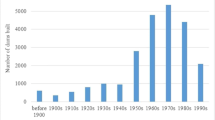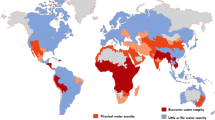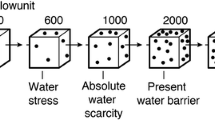Abstract
This paper applies optimal-control theory to develop groundwater exploitation strategies that account for potential climate change patterns in Brazil. Numerical experiments showed that whether climate change only affects groundwater quantity or whether it affects both groundwater quantity and quality, Brazilian water institutions will be able to implement optimal, equitable groundwater management strategies. However, they may be unable to achieve justice between current generations, while the economic, social, and environmental sustainability is likely to be favoured by a large regional groundwater availability. Institutional sustainability is ensured by the principles and institutions established by Brazil’s 1988 Constitution and by Law 9.433/97. Some sources of misunderstandings between managers and the research community are dealt with by suggesting directly applicable management strategies that accommodate stakeholder perceptions and desires. Some potential water policies based on the modelling results are discussed, with water conservation and water subsidies turning out to be beneficial for current and detrimental for future generations, respectively; in contrast, current generations paying for water at its social opportunity cost and being more concerned for future generations would benefit current generations.
Similar content being viewed by others
References
Adams G, Rausser G, Simon L (1996) Modelling multilateral negotiations: an application to California water policy. J Econ Behav Organ 30:97–111
Al-Sabbry MM, Harris DV, Fox R (2002) An economic assessment of groundwater recharge in the Tucson basin. J Am Water Resour Assoc 38:119–131
ANA (2007) GEO Brazil water resources. National Water Agency, Brazil
Ananda J, Crase L, Pagan PG (2006) A preliminary assessment of water institutions in India: an institutional design perspective. Rev Policy Res 23:927–953
Barreteau O, Garin P, Dumontier A, Abrami G, Cernesson F (2003) Agent based facilitation of water allocation: case study in the Drome River Valley. Group Decis Negot 12:441–461
Batabyal AA (1996) The queuing theoretic approach to groundwater management. Ecol Model 85:219–227
Becu N, Perez P, Walker A, Barreteau O, Page CL (2003) Agent based simulation of a small catchment water river management in northern Thailand: description of the CATCHSCAPE. Ecol Model 170:319–331
Bennet J, Blamey R (eds) (2001) The choice modelling approach to environmental evaluation. Edward Edgar, Cheltenham
Borowski I, Hare M (2007) Exploring the gap between water managers and researchers: difficulties of model-based tools to support practical water management. Water Resour Manage 21:1049–1074
Candela L, von Igel W, Elorza FJ, Aronica G (2009) Impact assessment of combined climate and management scenarios on groundwater resources and associated wetland (Majorca, Spain). J Hydrol 376:510–527
Carraro C, Marchiori C, Sgobbi A (2005) Applications of negotiation theory to water issues. Res Work Pap 47:1–47
Chen Z, Grasby SE, Osadetz KG (2002) Predicting average annual groundwater levels from climatic variables: an empirical model. J Hydrol 260:102–117
Don NC, Hang NTMH, Araki H, Yamanishi H, Koga K (2006) Groundwater resource management under environmental constraints in Shiroishi of Saga plain, Japan. Environ Geol 49:601–609
Emel J, Brooks E (1988) Changes in form and function of property rights institutions under threatened resource scarcity. Ann Assoc Am Geogr 78:241–252
Emel J, Roberts R (1995) Institutional form and its effect on environmental change: the case of groundwater in the Southern High Plans. Ann Assoc Am Geogr 85:664–683
FAO (2003) Groundwater management: the search for practical approaches. Water Reports, 25, Rome
Ganji A, Karamouz M, Khalili D (2007a) Development of stochastic dynamic Nash game model for reservoir operation I. The symmetric stochastic model with perfect information. Adv Water Resour 30:528–542
Ganji A, Khalili D, Karamouz M (2007b) Development of stochastic dynamic Nash game model for reservoir operation II. The value of players’ information availability and cooperative behaviours. Adv Water Resour 30:157–168
Hämäläinen R, Kettunen E, Marttunen M, Ehtamo H (2001) Evaluating a framework for multi-stakeholder decision support in water resource management. Group Decis Negot 10:331–353
Hanley N, Mourato S, Wright RE (2001) Choice modelling approaches: a superior alternative for environmental valuation? J Econ Surv 15:435–462
Hanson RT, Dettinger MD (2005) Groundwater/surface water responses to global climate simulations, Santa Clara—Calleguas Basin, Ventura, California. J Am Water Resour Assoc 44:517–536
Harsanyi JC (1963) A simplified bargaining model for n-person cooperative game. Int Econ Rev 4:194–220
Henriksen HJ, Rasmussen P, Brandt G, von Bülow D, Jensen FV (2007) Public participation modelling using Bayesian networks in management of groundwater contamination. Environ Model Softw 22:1101–1113
Holman IP (2005) Climate change impacts on groundwater recharge—uncertainty, shortcomings, and the way forward? Hydrogeol J 14:637–647
Holman IP, Tascone D, Hess TM (2009) A comparison of stochastic and deterministic downscaling methods for modelling potential groundwater recharge under climate change in East Anglia, UK: implications for groundwater resource management. Hydrogeol J 17:1629–1641
Hsu K-C, Wang C-H, Chen K-C, Chen C-T, Ma K-W (2007) Climate-induced hydrological impacts on the groundwater system of the Pingtung Plain, Taiwan. Hydrogeol J 15:903–913
Iglesias A, Garrote L, Flores F, Moneo M (2007) Challenges to manage the risk of water scarcity and climate change in the Mediterranean. Water Resour Manage 21:775–788
Ivey JL, Smithers J, de Loë RC, Kreutzwiser RD (2004) Community capacity for adaptation to climate-induced water shortages: linking institutional complexity and local actors. Environ Brief 33:36–47
Jha MK, Kamii Y, Chikamori K (2009) Cost-effective approaches for sustainable groundwater management in alluvial aquifer systems. Water Resour Manage 23:219–233
Jyrkama MI, Sykes JF (2007) The impact of climate change on spatially varying groundwater recharge in the grand river watershed (Ontario). J Hydrol 338:237–250
Kerachian R, Karamouz M (2007) A stochastic conflict resolution model for water quality management in reservoir-river systems. Adv Water Resour 30:866–882
Khan S, O’Connell N, Rana T, Xevi E (2008) Hydrologic-economic model for managing irrigation intensity in irrigation areas under water-table and soil salinity targets. Environ Model Assess 13:115–120
Koundouri P (2004) Current issues in the economics of groundwater resource management. J Econ Surv 18:703–740
Kovalevskii VS (2007) Effects of climate change on groundwater. Water Resour 34:140–152
Kretsinger Grabert V, Narasimhan TN (2006) California’s evolution toward integrated regional water management: a long term view. Hydrogeol J 14:407–423
Krol M, Jaeger A, Bronstert A, Güntner A (2006) Integrated modelling of climate, water, soil, agricultural and socio-economic processes: a general introduction of the methodology and some exemplary results from the semi-arid north-east of Brazil. J Hydrol 328:417–431
Krysanova V, Kundzewicz ZW, Pińskwar I, Habeck A (2006) Regional socio-economic and environmental changes and their impacts on water resources on example of Odra and Elbe Basin. Water Resour Manage 20:607–641
Loaiciga HA (2003) Climate change and groundwater. Ann Assoc Am Geogr 93:30–41
Lobo Ferreira J, Conceição Cunha M, Chachadi A, Nagel K, Diamantino C, Oliveira M (2007) Aquifer development planning to supply a seaside resort: a case study in Goa, India. Hydrogeol J 15:1147–1155
Lopez-Gunn E, Cortina LM (2005) Is self-regulation a myth? Case study on Spanish groundwater uses associations and the role of higher-level authorities. Hydrogeol J 14:361–379
Martín de Santa Olalla FJ, Domínguez A, Artigao A, Fabeiro C, Ortega JF (2005) Integrated water resources management of the hydro-geological unit “Eastern Mancha” using Bayesian Belief Networks. Agric Water Manag 77:21–36
Morehouse BJ (2000) Climate impacts on urban water resources in the Southwest: the importance of context. J Am Water Resour Assoc 36:265–277
Nash JF (1950) The bargaining problem. Econometrica 18:155–162
Neufeld DA (2000) An ecosystem approach to planning groundwater: the case of Waterloo region, Ontario, Canada. Hydrogeol J 8:239–250
Ojima D, Garcia L, Elgaali E, Miller K, Kittel TGF, Lackett J (1999) Potential climate change impacts on water resources in the Great Plains. J Am Water Resour Assoc 35:1143–1454
Provencher B, Burt O (1993) The externalities associated with the common property exploitation of groundwater. J Environ Econ Manage 24:139–158
Provencher B, Burt O (1994) A private property rights regime for the commons: the case of groundwater. Land Econ 69:325–340
Purkey DR, Huber-Lee A, Yates DN, Hanemann M, Herrod-Julius S (2007) Integrating a climate change assessment tool into stakeholder-driven water management decision-making process in California. Water Resour Manage 21:315–329
Quinn NWT, Brekke LD, Miller NL, Heinzer T, Hidalgo H, Dracup JA (2004) Model integration for assessing future hydro-climate impacts on water resources, agricultural production and environmental quality in the San Joaquin Basin, California. Environ Model Softw 19:305–316
Qureshi ME, Qureshi SE, Bajracharya K, Kirby M (2008) Integrated biophysical and economic modelling framework to assess impacts of alternative groundwater management options. Water Resour Manage 22:321–341
Randhir T, Genge C (2005) Watershed based, institutional approach to developing clean water resources. J Am Water Resour Assoc 4:413–424
Ranjan SP, Kazama S, Sawamoto M (2006a) Effects of climate change on coastal fresh groundwater resources. Glob Environ Change 16:388–399
Ranjan SP, Kazama S, Sawamoto M (2006b) Effects of climate and land use changes on groundwater resources in coastal aquifers. J Environ Manag 80:25–35
Rosenzweig C, Strzepek KM, Major DC, Iglesias A, Yates DN, McCluskey A, Hillel D (2004) Water resources for agriculture in a changing climate: international case studies. Glob Environ Change 14:345–360
Roseta-Palma C (2002) Groundwater management when water quality is endogenous. J Environ Econ Manage 44:93–105
Salazar R, Szidarovszky F, Coppola EJ, Rojano A (2007) Application of game theory for a groundwater conflict in Mexico. J Environ Manag 84:560–571
Scibek J, Allen DM (2006) Modelled impacts of predicted climate change on recharge and groundwater levels. Water Resour Res 42:W11405. doi:10.1029/2005WR004742
Semadeni-Davies A (2004) Urban water management vs. climate change: impacts on cold region waste water inflows. Clim Change 64:103–126
Tanaka SK, Tingju Z, Lund JR, Howitt RE, Jenkins MW, Pulido MA, Tauber M, Ritzema RS, Ferreira IC (2006) Climate warming and water management adaptation for California. Clim Change 76:361–387
Thiesse E, Loucks D, Stedinger J (1998) Computer assisted negotiation of water resource conflicts. Group Decis Negot 7:109–129
Thoyer S, Morardet S, Rio P, Simon L, Goodhue R, Rausser G (2001) A bargaining model to simulate negotiations between water users. JASSS 4(2). http://www.soc.surrey.ac.uk/JASSS/4/2/6.html
Vicuna S, Maurer EP, Joyce B, Dracup JA, Purkey D (2007) The sensitivity of California water resources to climate change scenarios. J Am Water Resour Assoc 43:482–498
Wang M, Zheng C (1996) Groundwater management optimisation using genetic algorithms and simulated annealing: formulation and comparison. J Am Water Resour Assoc 34:519–530
White I, Howe J (2004) The mismanagement of surface water. Appl Geogr 24:261–280
Woldeamlak ST, Batelaan O, De Smedt F (2007) Effects of climate change on the groundwater system in the Grote–Nete catchment, Belgium. Hydrogeol J 15:891–901
Zeitouni N (2004) Optimal extraction from a renewable groundwater aquifer with stochastic recharge. Water Resour Res 40:W06S19. http://www.agu.org. doi:10.1029/2003WR002162
Author information
Authors and Affiliations
Corresponding author
Rights and permissions
About this article
Cite this article
Zagonari, F. Sustainable, Just, Equal, and Optimal Groundwater Management Strategies to Cope with Climate Change: Insights from Brazil. Water Resour Manage 24, 3731–3756 (2010). https://doi.org/10.1007/s11269-010-9630-z
Received:
Accepted:
Published:
Issue Date:
DOI: https://doi.org/10.1007/s11269-010-9630-z




